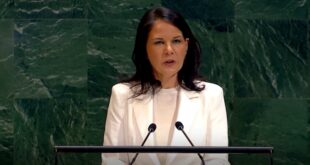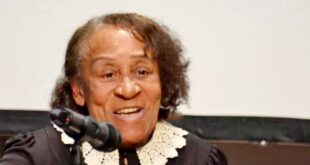One of the oldest living Germans of African descent has passed on. Theodor Wonja Michael died in Cologne on Saturday (19 October), aged 94.
Michael, who was born on 15 January 1925 as the youngest of four children to a father from Cameroon and a German mother, was one of the few remaining Black Germans who lived through the horrors of the Nazi era to tell the story.

In his autobiography Deutsch Sein und Schwarz Dazu (“To Be German and Black”), he talked about how he miraculously survived both the terrors of the Hitler’s regime and the Second World War, and narrated his personal experiences in a way that “makes contemporary history comprehensible”, in the words of the author and filmmaker Annette von Wangenheim.
As a child, Theodor Wonja Michael was forced to participate at Völkerschauen (ethnographic exhibitions), where human beings were made to display a “typical African lifestyle” to the public in situations akin to a human zoo. He also worked as a hotel porter and performed minor, demeaning roles in Nazi propaganda films during the war to make ends meet.

“Wherever I went and stood, I was stared at, strangers were running their fingers through my hair, smelling me,” he wrote in his autobiography Deutsch Sein und Schwarz Dazu (“To Be German and Black”), which appeared in 2013. The indignities he suffered during the war years haunted him perhaps to his very last day. He never stopped to talk about his experiences during that particularly painful chapter of his long life.
READ ALSO Book Review: Memories of Theodor Wonja Michael
However, Theodor Wonja Michael recognised that he was lucky to survive the Nazi era, as more than 2,000 Black people perished in the concentration camps while hundreds of others were forcibly sterilised.
After the war, he pulled himself together, overcame his emotional injuries, studied politics in Hamburg and Paris and worked as a journalist, eventually establishing the journal Afrika-Bulletin and became a renowned expert on Africa.

Paradoxically, Theodor Wonja Michael was offered a job by the German intelligence service (Bundesnachrichtendienst) on the grounds of his expertise on Africa. He explained in his autobiography that he accepted the difficult offer to open doors for other Black people in Germany as it’s their land.
Theodor Wonja Michael rose through the ranks in the federal civil service, retiring as a director in 1987. He was the first federal government official of African descent in the higher service in Germany. Another history made.
After his retirement from the German intelligence service Theodor Wonja Michael picked up his acting career again and also participated actively in Germany’s Black community, attending events, speaking on his life and reading from his book.

Theodor Wonja Michael became a living embodiment of Black German history. He often talked publicly about racism, reminding society that though the laws of the past no longer existed the attitudes of many had not changed.
Michael’s voice challenged German society to look back at its past to avoid repeating its mistakes. He was also a living evidence of the long roots of people of African origin in the country.
READ ALSO Talking about what it means to be Black in Germany
According to the Initiative of Black People in Germany (Initiative Schwarze Menschen in Deutschland or ISD), of which Michael was an active member until the end of his life, there is only one other member of his generation still alive.

With the passing of Theodor Wonja Michael, a chapter in the history of Black people Germany could be said to have come to an end. Michael, who is survived by several children and grandchildren, will be buried on Monday, 28 October in Cologne.
Femi Awoniyi
An online condolence book has been opened at: https://www.gedenkseiten.de/theodor-wonja-michael/
 THE AFRICAN COURIER. Reporting Africa and its Diaspora! The African Courier is an international magazine published in Germany to report on Africa and the Diaspora African experience. The first issue of the bimonthly magazine appeared on the newsstands on 15 February 1998. The African Courier is a communication forum for European-African political, economic and cultural exchanges, and a voice for Africa in Europe.
THE AFRICAN COURIER. Reporting Africa and its Diaspora! The African Courier is an international magazine published in Germany to report on Africa and the Diaspora African experience. The first issue of the bimonthly magazine appeared on the newsstands on 15 February 1998. The African Courier is a communication forum for European-African political, economic and cultural exchanges, and a voice for Africa in Europe.




























